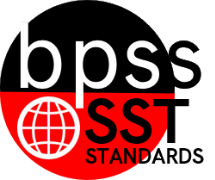8th Grade Standards
| Civics |
SST-08.C.01 8th Grade (SST) Social StudiesCivics StandardSST-08.C.01 Explain the historical and philosophical foundations of government.Benchmarks
Guiding PracticeThe guiding topics for each benchmark includes various subject matter that can be used to help students reach the standard. Calculation Method for StandardsStandards are larger groups of related benchmarks. So the Standard is a calculation of all the related benchmarks. So click on the benchmark identifier below each Standards to access the learning targets and proficiency scales for each standard. | |
SST-08.C.01.1
8th Grade (SST) Civics Domain: SST-08.C.01.1 Evaluate the thoughts of major political philosophers.Guiding Topics: Cicero, Socrates, Plato, Aristotle, Iroquois Confederation, Locke, Hobbes, Montesquieu, Rousseau, Marx, Natural Rights Philosophy, Classical Republicanism Student Learning Targets:Knowledge Targets
Reasoning Targets
Skills (Performance) Targets
Product Targets
Proficiency ScaleThe Student can ...1 Beginning... with help, demonstrate a partial understanding of some of the simpler details and processes (Score 2.0 content) and some of the more complex ideas and processes (Score 3.0 content).
2 Developing... demonstrate no major errors or omissions regarding the simpler details and processes but exhibits major errors or omissions regarding the more complex ideas and processes (Score 3.0 content).
3 Proficient“The Standard.”... demonstrate no major errors or omissions regarding any of the information and processes that were end of instruction expectations.
4 Advanced... demonstrate in-depth inferences and applications regarding more complex material that go beyond end of instruction expectations.
ResourcesVocabulary
Websites
| |
SST-08.C.01.2
8th Grade (SST) Civics Domain: SST-08.C.01.2 Explain the influence of British and colonial history on early United States.Guiding Topics: Magna Carta, English Bill of Rights, Petition of Right, Mayflower Compact, formation of colonial governments, deterioration of relations with Great Britain Student Learning Targets:Knowledge Targets
Reasoning Targets
Skills (Performance) Targets
Product Targets
Proficiency ScaleThe Student can ...1 Beginning... with help, demonstrate a partial understanding of some of the simpler details and processes (Score 2.0 content) and some of the more complex ideas and processes (Score 3.0 content).
2 Developing... demonstrate no major errors or omissions regarding the simpler details and processes but exhibits major errors or omissions regarding the more complex ideas and processes (Score 3.0 content).
3 Proficient“The Standard.”... demonstrate no major errors or omissions regarding any of the information and processes that were end of instruction expectations.
4 Advanced... demonstrate in-depth inferences and applications regarding more complex material that go beyond end of instruction expectations.
ResourcesVocabulary
Websites
| |
SST-08.C.01.3
8th Grade (SST) Civics Domain: SST-08.C.01.3 Evaluate the creation and impact of primary sources on political thought in the United States.Guiding Topics: Magna Carta, English Bill of Rights, Petition of Right, Mayflower Compact, Declaration of Independence, Articles of Confederation, Federalist Papers, AntiFederalist Papers, Virginia and New Jersey Plans, the Great Compromise, Constitution, the Bill of Rights Student Learning Targets:Knowledge Targets
Reasoning Targets
Skills (Performance) Targets
Product Targets
Proficiency ScaleThe Student can ...1 Beginning... with help, demonstrate a partial understanding of some of the simpler details and processes (Score 2.0 content) and some of the more complex ideas and processes (Score 3.0 content).
2 Developing... demonstrate no major errors or omissions regarding the simpler details and processes but exhibits major errors or omissions regarding the more complex ideas and processes (Score 3.0 content).
3 Proficient“The Standard.”... demonstrate no major errors or omissions regarding any of the information and processes that were end of instruction expectations.
4 Advanced... demonstrate in-depth inferences and applications regarding more complex material that go beyond end of instruction expectations.
ResourcesVocabulary
Websites
| |
SST-08.C.02 8th Grade (SST) Social StudiesCivics StandardSST-08.C.02 Analyze the structures and functions of governments.Benchmarks
Guiding PracticeThe guiding topics for each benchmark includes various subject matter that can be used to help students reach the standard. Calculation Method for StandardsStandards are larger groups of related benchmarks. So the Standard is a calculation of all the related benchmarks. So click on the benchmark identifier below each Standards to access the learning targets and proficiency scales for each standard. | |
SST-08.C.02.1
8th Grade (SST) Civics Domain: SST-08.C.02.1 Differentiate/compare forms and origins of governments.Guiding Topics: Democracy, monarchy, oligarchy, tyranny, fascism, communism, theocracy, constitutional republic, parliamentary democracy, presidential democracy, and other forms of governments Student Learning Targets:Knowledge Targets
Reasoning Targets
Skills (Performance) Targets
Product Targets
Proficiency ScaleThe Student can ...1 Beginning... with help, demonstrate a partial understanding of some of the simpler details and processes (Score 2.0 content) and some of the more complex ideas and processes (Score 3.0 content).
2 Developing... demonstrate no major errors or omissions regarding the simpler details and processes but exhibits major errors or omissions regarding the more complex ideas and processes (Score 3.0 content).
3 Proficient“The Standard.”... demonstrate no major errors or omissions regarding any of the information and processes that were end of instruction expectations.
4 Advanced... demonstrate in-depth inferences and applications regarding more complex material that go beyond end of instruction expectations.
ResourcesVocabulary
Websites
| |
SST-08.C.02.2
8th Grade (SST) Civics Domain: SST-08.C.02.2 Examine the role and purposes of government.Guiding Topics: Purpose of founding governments in River Valley, Asian, Greek, Roman, African, Mesoamerican civilizations and the purpose of current government systems (i.e., to maintain law and order, authority, legitimacy, sovereignty) Student Learning Targets:Knowledge Targets
Reasoning Targets
Skills (Performance) Targets
Product Targets
Proficiency ScaleThe Student can ...1 Beginning... with help, demonstrate a partial understanding of some of the simpler details and processes (Score 2.0 content) and some of the more complex ideas and processes (Score 3.0 content).
2 Developing... demonstrate no major errors or omissions regarding the simpler details and processes but exhibits major errors or omissions regarding the more complex ideas and processes (Score 3.0 content).
3 Proficient“The Standard.”... demonstrate no major errors or omissions regarding any of the information and processes that were end of instruction expectations.
4 Advanced... demonstrate in-depth inferences and applications regarding more complex material that go beyond end of instruction expectations.
ResourcesVocabulary
Websites
| |
SST-08.C.02.3
8th Grade (SST) Civics Domain: SST-08.C.02.3 Analyze the structure, principles, and interpretation of the Constitution of the United States.Guiding Topics: Preamble, articles, amendments, separation of powers, checks and balances, power of the purse, impeachment, advise and consent, veto power, judicial review, bicameralism, etc. Student Learning Targets:Knowledge Targets
Reasoning Targets
Skills (Performance) Targets
Product Targets
Proficiency ScaleThe Student can ...1 Beginning... with help, demonstrate a partial understanding of some of the simpler details and processes (Score 2.0 content) and some of the more complex ideas and processes (Score 3.0 content).
2 Developing... demonstrate no major errors or omissions regarding the simpler details and processes but exhibits major errors or omissions regarding the more complex ideas and processes (Score 3.0 content).
3 Proficient“The Standard.”... demonstrate no major errors or omissions regarding any of the information and processes that were end of instruction expectations.
4 Advanced... demonstrate in-depth inferences and applications regarding more complex material that go beyond end of instruction expectations.
ResourcesVocabulary
Websites
| |
SST-08.C.02.4
8th Grade (SST) Civics Domain: SST-08.C.02.4 Explain the relationship among federal, state, tribal, and local governmental powers.Guiding Topics: Necessary and proper clause, the commerce clause,
Tenth Amendment, enumerated powers vs. reserved powers, amendment process, separation of powers, revenue sources, coining money, treaty powers, interstate commerce, treaty rights and tribal sovereignty, etc. Student Learning Targets:Knowledge Targets
Reasoning Targets
Skills (Performance) Targets
Product Targets
Proficiency ScaleThe Student can ...1 Beginning... with help, demonstrate a partial understanding of some of the simpler details and processes (Score 2.0 content) and some of the more complex ideas and processes (Score 3.0 content).
2 Developing... demonstrate no major errors or omissions regarding the simpler details and processes but exhibits major errors or omissions regarding the more complex ideas and processes (Score 3.0 content).
3 Proficient“The Standard.”... demonstrate no major errors or omissions regarding any of the information and processes that were end of instruction expectations.
4 Advanced... demonstrate in-depth inferences and applications regarding more complex material that go beyond end of instruction expectations.
ResourcesVocabulary
Websites
| |
SST-08.C.02.5
8th Grade (SST) Civics Domain: SST-08.C.02.5 Explain the purposes, organization, powers, and processes of tribal and local governments.Guiding Topics: Elections, revenue sources, tribal sovereignty Student Learning Targets:Knowledge Targets
Reasoning Targets
Skills (Performance) Targets
Product Targets
Proficiency ScaleThe Student can ...1 Beginning... with help, demonstrate a partial understanding of some of the simpler details and processes (Score 2.0 content) and some of the more complex ideas and processes (Score 3.0 content).
2 Developing... demonstrate no major errors or omissions regarding the simpler details and processes but exhibits major errors or omissions regarding the more complex ideas and processes (Score 3.0 content).
3 Proficient“The Standard.”... demonstrate no major errors or omissions regarding any of the information and processes that were end of instruction expectations.
4 Advanced... demonstrate in-depth inferences and applications regarding more complex material that go beyond end of instruction expectations.
ResourcesVocabulary
Websites
| |
SST-08.C.03 8th Grade (SST) Social StudiesCivics StandardSST-08.C.03 Describe the rights and liberties of individuals.Benchmarks
Guiding PracticeThe guiding topics for each benchmark includes various subject matter that can be used to help students reach the standard. Calculation Method for StandardsStandards are larger groups of related benchmarks. So the Standard is a calculation of all the related benchmarks. So click on the benchmark identifier below each Standards to access the learning targets and proficiency scales for each standard. | |
SST-08.C.03.1
8th Grade (SST) Civics Domain: SST-08.C.03.1 Describe and examine the amendments to the United States Constitution and their application in the United States.Guiding Topics: Bill of Rights, amendments, relevant court cases Student Learning Targets:Knowledge Targets
Reasoning Targets
Skills (Performance) Targets
Product Targets
Proficiency ScaleThe Student can ...1 Beginning... with help, demonstrate a partial understanding of some of the simpler details and processes (Score 2.0 content) and some of the more complex ideas and processes (Score 3.0 content).
2 Developing... demonstrate no major errors or omissions regarding the simpler details and processes but exhibits major errors or omissions regarding the more complex ideas and processes (Score 3.0 content).
3 Proficient“The Standard.”... demonstrate no major errors or omissions regarding any of the information and processes that were end of instruction expectations.
4 Advanced... demonstrate in-depth inferences and applications regarding more complex material that go beyond end of instruction expectations.
ResourcesVocabulary
Websites
| |
SST-08.C.03.2
8th Grade (SST) Civics Domain: SST-08.C.03.2 Describe the impact of court cases on the rights and liberties of individuals.Guiding Topics: Judicial review, incorporation doctrine Student Learning Targets:Knowledge Targets
Reasoning Targets
Skills (Performance) Targets
Product Targets
Proficiency ScaleThe Student can ...1 Beginning... with help, demonstrate a partial understanding of some of the simpler details and processes (Score 2.0 content) and some of the more complex ideas and processes (Score 3.0 content).
2 Developing... demonstrate no major errors or omissions regarding the simpler details and processes but exhibits major errors or omissions regarding the more complex ideas and processes (Score 3.0 content).
3 Proficient“The Standard.”... demonstrate no major errors or omissions regarding any of the information and processes that were end of instruction expectations.
4 Advanced... demonstrate in-depth inferences and applications regarding more complex material that go beyond end of instruction expectations.
ResourcesVocabulary
Websites
| |
SST-08.C.04 8th Grade (SST) Social StudiesCivics StandardSST-08.C.04 Investigate the role and responsibilities of citizenship in society.Benchmarks
Guiding PracticeThe guiding topics for each benchmark includes various subject matter that can be used to help students reach the standard. Calculation Method for StandardsStandards are larger groups of related benchmarks. So the Standard is a calculation of all the related benchmarks. So click on the benchmark identifier below each Standards to access the learning targets and proficiency scales for each standard. | |
SST-08.C.04.1
8th Grade (SST)Civics Domain: SST-08.C.04.1 Explain how citizens can influence government.Guiding Topics: Interest groups, the media, political action committees, voluntary and civic associations, professional organizations, individuals, voting, running for office, petitioning the government, initiated measures, referendum, recall, peaceful protests, demonstrations Student Learning Targets:Knowledge Targets
Reasoning Targets
Skills (Performance) Targets
Product Targets
Proficiency ScaleThe Student can ...1 Beginning... with help, demonstrate a partial understanding of some of the simpler details and processes (Score 2.0 content) and some of the more complex ideas and processes (Score 3.0 content).
2 Developing... demonstrate no major errors or omissions regarding the simpler details and processes but exhibits major errors or omissions regarding the more complex ideas and processes (Score 3.0 content).
3 Proficient“The Standard.”... demonstrate no major errors or omissions regarding any of the information and processes that were end of instruction expectations.
4 Advanced... demonstrate in-depth inferences and applications regarding more complex material that go beyond end of instruction expectations.
ResourcesVocabulary
Websites
| |
SST-08.C.04.2
8th Grade (SST) Civics Domain: SST-08.C.04.2 Describe and evaluate the criteria and process for naturalization in the United States.Guiding Topics: Citizenship test and pledge, historic and present restrictions and requirements for naturalization Student Learning Targets:Knowledge Targets
Reasoning Targets
Skills (Performance) Targets
Product Targets
Proficiency ScaleThe Student can ...1 Beginning... with help, demonstrate a partial understanding of some of the simpler details and processes (Score 2.0 content) and some of the more complex ideas and processes (Score 3.0 content).
2 Developing... demonstrate no major errors or omissions regarding the simpler details and processes but exhibits major errors or omissions regarding the more complex ideas and processes (Score 3.0 content).
3 Proficient“The Standard.”... demonstrate no major errors or omissions regarding any of the information and processes that were end of instruction expectations.
4 Advanced... demonstrate in-depth inferences and applications regarding more complex material that go beyond end of instruction expectations.
ResourcesVocabulary
Websites
| |
SST-08.C.04.3 8th Grade (SST) Civics Domain: SST-08.C.04.3 Explain how citizens’ personal and civic responsibilities are important to the preservation and improvement of United States constitutional republic.Guiding Topics: Voting rights, running for public office, obeying the law, being informed and attentive to public issues, monitoring political leaders and governmental agencies, assuming leadership when appropriate, paying taxes, registering to vote and voting knowledgeably on candidates and issues, serving as a juror, serving in the armed forces, performing public service Student Learning Targets:Knowledge Targets
Reasoning Targets
Skills (Performance) Targets
Product Targets
Proficiency ScaleThe Student can ...1 Beginning... with help, demonstrate a partial understanding of some of the simpler details and processes (Score 2.0 content) and some of the more complex ideas and processes (Score 3.0 content).
2 Developing... demonstrate no major errors or omissions regarding the simpler details and processes but exhibits major errors or omissions regarding the more complex ideas and processes (Score 3.0 content).
3 Proficient“The Standard.”... demonstrate no major errors or omissions regarding any of the information and processes that were end of instruction expectations.
4 Advanced... demonstrate in-depth inferences and applications regarding more complex material that go beyond end of instruction expectations.
ResourcesVocabulary
Websites
| |
SST-08.C.04.4
8th Grade (SST) Civics Domain: SST-08.C.04.4 Identify bias and evaluate its role in media sources.Guiding Topics: Broadcast news, print news, websites, social media, speeches, and other primary and secondary sources Student Learning Targets:Knowledge Targets
Reasoning Targets
Skills (Performance) Targets
Product Targets
Proficiency ScaleThe Student can ...1 Beginning... with help, demonstrate a partial understanding of some of the simpler details and processes (Score 2.0 content) and some of the more complex ideas and processes (Score 3.0 content).
2 Developing... demonstrate no major errors or omissions regarding the simpler details and processes but exhibits major errors or omissions regarding the more complex ideas and processes (Score 3.0 content).
3 Proficient“The Standard.”... demonstrate no major errors or omissions regarding any of the information and processes that were end of instruction expectations.
4 Advanced... demonstrate in-depth inferences and applications regarding more complex material that go beyond end of instruction expectations.
ResourcesVocabulary
Websites
| |
SST-08.C.04.5
8th Grade (SST) Civics Domain: SST-08.C.04.5 Demonstrate active participation in civic life.Guiding Topics: Voting, attending political and governmental meetings, contacting public officials, working in campaigns, community organizing, demonstrating or picketing, mock trials, simulated congressional hearings, Socratic seminar, civil discourse, debate, boycotting, joining interest groups or political action committees, etc. Student Learning Targets:Knowledge Targets
Reasoning Targets
Skills (Performance) Targets
Product Targets
Proficiency ScaleThe Student can ...1 Beginning... with help, demonstrate a partial understanding of some of the simpler details and processes (Score 2.0 content) and some of the more complex ideas and processes (Score 3.0 content).
2 Developing... demonstrate no major errors or omissions regarding the simpler details and processes but exhibits major errors or omissions regarding the more complex ideas and processes (Score 3.0 content).
3 Proficient“The Standard.”... demonstrate no major errors or omissions regarding any of the information and processes that were end of instruction expectations.
4 Advanced... demonstrate in-depth inferences and applications regarding more complex material that go beyond end of instruction expectations.
ResourcesVocabulary
Websites
| |





